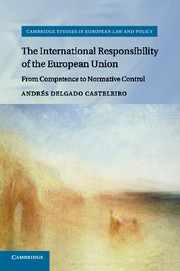Book contents
- Frontmatter
- Contents
- Series Editors' Preface
- Acknowledgements
- Introduction
- 1 The EU's Normative Control and International Responsibility
- 2 Codifying of the Responsibility of International Organizations (I): The Impact of ARIO's Rules of Attribution on the EU
- 3 Codifying of the Responsibility of International Organizations (II): The Impact of ARIO's Rules of Responsibility on the EU
- 4 EU Declarations of Competence to Multilateral Agreements: A Useful Internal Reference Base?
- 5 The Apportionment of the EU's International Responsibility in International Environmental Law: The International Application of EU Declarations of Competence
- 6 The EU's Normative Control and International Responsibility: The WTO Dispute Settlement System
- 7 Normative Control in the EU and the Responsibility of Member States: An Analysis of the Responsibility of the EU in International Investment Law
- Conclusions
- Bibliography
- Index
Series Editors' Preface
Published online by Cambridge University Press: 05 September 2016
- Frontmatter
- Contents
- Series Editors' Preface
- Acknowledgements
- Introduction
- 1 The EU's Normative Control and International Responsibility
- 2 Codifying of the Responsibility of International Organizations (I): The Impact of ARIO's Rules of Attribution on the EU
- 3 Codifying of the Responsibility of International Organizations (II): The Impact of ARIO's Rules of Responsibility on the EU
- 4 EU Declarations of Competence to Multilateral Agreements: A Useful Internal Reference Base?
- 5 The Apportionment of the EU's International Responsibility in International Environmental Law: The International Application of EU Declarations of Competence
- 6 The EU's Normative Control and International Responsibility: The WTO Dispute Settlement System
- 7 Normative Control in the EU and the Responsibility of Member States: An Analysis of the Responsibility of the EU in International Investment Law
- Conclusions
- Bibliography
- Index
Summary
The international responsibility of the European Union is a veritable minefield, with many an unexpected surprise for the unwary. One of the great strengths of Delgado Castelerio's study is that he plots a sure path through the minefield of how different international bodies understand the relationship between the European Union and its Member States in establishing responsibility for breach of an international agreement directly caused by the implementation of EU law.
After exposing the divisions even within the Court of Justice on international responsibility, and looking at the EU's normative control in this area, the author critically reviews the International Law Commission's Draft Articles on International Responsibility of International Organizations. The weaknesses of declarations of competence are then exposed, particularly in view of the evolutionary nature of EU law and competence: mere declarations offer the appearance of certainty, but not the reality. The study then discusses the EU's international responsibility in three areas: environmental law (UNCLOS and the Aarhus Convention Compliance Committee), the WTO Dispute Settlement Mechanism and International Investment Law.
On the basis of this study, the author argues that normative control should have some consequences in the international sphere, especially as concerns attribution of responsibility, so that the EU should in most areas be responsible for the acts of its Member States in their implementation of EU law, although in relation to actions falling under the EU's Common Foreign and Security Policy, joint responsibility would be appropriate.
This study covers an often neglected aspect of EU law, but one which is of major importance, both in the EU's international relations and in the relationship between the EU and its Member States. It is a major scholarly contribution to the literature on the international responsibility of the Union, and is written accessibly, and stimulatingly. For all these reasons, we very much welcome it as a most timely and opportune addition to Cambridge Studies in European Law and Policy.
- Type
- Chapter
- Information
- The International Responsibility of the European UnionFrom Competence to Normative Control, pp. xv - xviPublisher: Cambridge University PressPrint publication year: 2016



